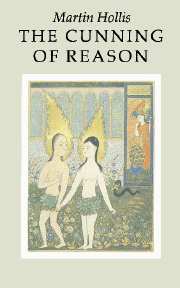Book contents
- Frontmatter
- Contents
- Preface
- 1 The sovereign artificer
- 2 Rational choice
- 3 Norms and institutions
- 4 The Cunning of Reason I: unintended consequences
- 5 Motivation
- 6 External and internal reasons
- 7 Rational Expectations
- 8 Maximising and satisficing
- 9 The Cunning of Reason II: functions and rules
- 10 Reasons and roles
- 11 Rationality and understanding
- 12 The Cunning of Reason III: self and society
- Bibliography
- Index
12 - The Cunning of Reason III: self and society
Published online by Cambridge University Press: 15 December 2009
- Frontmatter
- Contents
- Preface
- 1 The sovereign artificer
- 2 Rational choice
- 3 Norms and institutions
- 4 The Cunning of Reason I: unintended consequences
- 5 Motivation
- 6 External and internal reasons
- 7 Rational Expectations
- 8 Maximising and satisficing
- 9 The Cunning of Reason II: functions and rules
- 10 Reasons and roles
- 11 Rationality and understanding
- 12 The Cunning of Reason III: self and society
- Bibliography
- Index
Summary
Even in a market town the roles of town life furnish reasons for market behaviour. Market relations remain social relations, both when we scale the town up until it becomes a large, impersonal city, and when we scale it down until its rhythms harmonise with the natural world around it. They remain social relations also, if we vary the form of government to expand or shrink the public demands on private life. In Sparta, Salt Lake City or Peking there have been times when the gods of heaven or the state have declared all business public business. In Athens or Amsterdam, by contrast, the state takes only a tithe of social life and otherwise leaves citizens to their private purposes. But private purposes have their mores: grocers have neighbours, lovers play roles and there is honour among thieves. The rules vary from town to town and time to time. But, whatever they may be, they enable and constrain the life of the inhabitants. History matters greatly for understanding variations but, as Hume remarked, it informs of nothing new or strange in this particular.
That leaves unfinished business under three main headings. The first is the final, broad terms of settlement between rational choice and social agency. The second is the residual work, in the form of systematic features of social life thus unaccounted for, to be assigned to the Cunning of Reason. The third is a tantalising question about the self. I shall preface the agenda, however, with a word on social explanation and about the place of nature in the argument.
- Type
- Chapter
- Information
- The Cunning of Reason , pp. 194 - 214Publisher: Cambridge University PressPrint publication year: 1988



